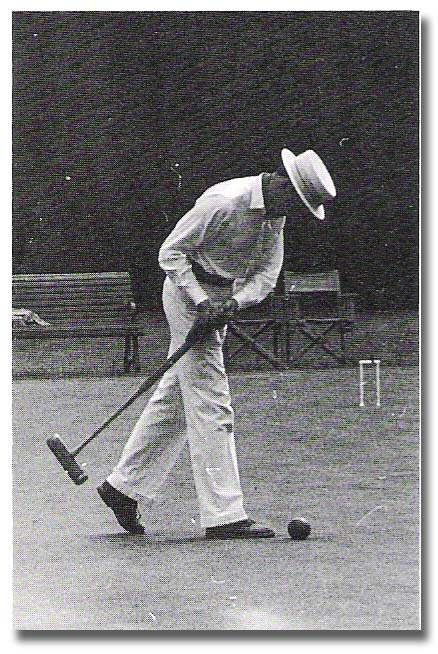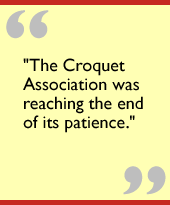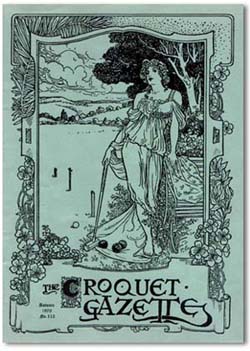

|
Back to |
| The Front Page |
| People |
|
Bryan Lloyd-Pratt and The Croquet Gazette |
|||||||||||
|
by James Hawkins layout by Reuben Edwards Posted December 10, 2005 |
|
||||||||||
The publication of The Croquet Gazette, the official bimonthly of the English Croquet Association, has been managed by many editors since its inception in 1904, each with his or her special attributes. None was more colourful or controversial than Bryan Lloyd-Pratt in his tumultuous four-issue tenure in the early 1970s. Former Croquet Gazette editor James Hawkins – who, happily, produced a total of 22 excellent issues – recalls the short and gloriously goofy editorial reign of one of croquet’s most brilliant eccentrics. Readers should note that the long quotes from Bryan Lloyd-Pratt’s editorials are printed here in black in something close to their original typography, while Hawkins’ comments are rendered in contemporary blue.
Everyone loves an eccentric. Well, that’s not a hundred percent true – the aspects of a personality which are superficially entertaining or refreshing often conceal an infuriating and alarming inner self.
Lloyd-Pratt was a well-known figure on the English tournament circuit in the 1960s. He played to a high level, though his one term of service on the English Test Team passed without much note. A few players in the UK still remember him – his skipping on to the lawn, larger than life, and with a straw hat festooned with coloured ribbons. His unique style was celebrated in six lines of verse well known in croquet circles:
His popularity with a younger generation of players was, by some accounts, not shared by all. His antagonism towards elderly ladies often left these opponents in tears on the sidelines. Nevertheless, there was little inkling within the Association that his appointment, in 1970, as editor of The Croquet Gazette could be anything other than a good move.
The first Lloyd-Pratt magazine, when it appeared in people’s letterboxes, was a handsome publication. Chunkily produced on thick, extra-high quality paper, the majestic design oozed quality and opulence. Readers must have been more concerned with the content of Bryan’s editorial, reproduced here in full:
Croquet attracts eccentrics like moths ‘round a candle flame. The most obvious example is Walter Whitmore, inventor of the game, aristocratic Victorian idler, bad poet, and crackpot designer of a host of useless items. His fall from favour, and the political schism of the early days of the All England Croquet Club, is well documented elsewhere. A century later another figure surfaced in British croquet, that of Bryan Lloyd-Pratt, who would cause his own ripples ‘round the croquet world and beyond.

The sidestroke was seldom seen in top-level play by the 1960s. But Lloyd-Pratt's elegantly fluid version of it - shown here in a rare action photograph - was deadly effective.
Bryan Lloyd-Pratt
In his yellow straw hat
Gives the Manager plenty of troubles.
See him gossip and giggle
And walk with a wiggle
While he revels in handicap doubles.

Spring 1970 No 110
The Official Organ of the Croquet Association
Patron:
Her Majesty The Queen
Survival, Expansion or Decline?
Croquet has been “dying” ever since the Great War shattered Western civilization. The “Jazz and Aspirin Age” that ensued was thoroughly inimical to a sport which was subtle, leisurely, and, most damning of all, old-fashioned – “fuddy-duddy” to use the argot of the day.
We believe that the problems that confront competitive croquet now are vastly different from those of the inter-war years. The first is lack of space. In an overcrowded, and increasingly nasty modern world, the idea, even, of a beautifully kept, level piece of choice turf being occupied for over four hours by only two people (bourgeois reactionaries, at that) for one game, seems, to those who have a hypersensitive social conscience, to be a crime against the modern democratic way of life. Certainly the pressure on the more popular Official Tournaments in the high summer does bear out the contention that, at any rate at some times in the year, more courts would be very acceptable, even to the few Associates at present on the List. Also, the sad fate that recently befell the Roehampton Club must serve as a dire warning to the C.A. of what can occur when more powerful rival interests threaten the future of our beloved sport.
However, these dangers are very obvious. The dangers against which we should like to utter a warning are more insidious, and very much harder to define. Croquet and this fact must be squarely faced and not evaded, is a demanding game. Its delights cannot be savoured until after a period of often lengthy and unrewarding application has been undergone. Certainly it is a good game. Indeed, just as chess is better than bingo, or bridge is better than whist; so is croquet better than, say, bowls. This is not to say that that jejune and proletarian pastime is not more suitable for the majority of people – it is. But this is where the modern social conscience rears its misshapen head again. People have been so brainwashed by sociologists, technocrats, and bureaucrats (gloriously horrid words for an unpleasant phenomenon) into believing that the greatest-good-for-the-greatest-number is all-important, that many people have come to feel, almost subconsciously, that quality and excellence are somehow to be deplored and reprehended. Croquet is particularly vulnerable to such qualms. Born by Privilege out of Luxury, it possesses still an atmosphere of disdain and exclusiveness. The click of croquet balls (less authoritative since composition replaced boxwood) is the sweet accompaniment to a long-vanished douceur de vivre. This is nothing to be ashamed of. It may not be true. Indeed, we believe that it is, alas! now a very false picture of the modern game. Nevertheless, nothing can be gained, and a great deal could be lost, by playing down this aspect of Croquet.
Our contention is that to preserve the game as we know it, it could be fatal to try to broaden the basis of Croquet. The only way in which new Associates who have something to give to the game can be induced to take it up is by friendly persuasion and interest from someone whom they know, or get to know, and like. Schemes for coaching, television and press coverage, and similar ventures never produce any worth-while results, and often cheapen the sport.
If Croquet is to survive it must be true to itself.
Two editions into his tenure, the Council of the Croquet Association were shifting uncomfortably, in the light of Lloyd-Pratt’s unpalatable views. It’s clear that a warning was issued from the CA before the Autumn edition. By now, though, there was also a clamorous group within the general membership calling for the Editor to be reined in. His reaction, both through his editorial and through the letters page in Issue 112, was remarkably unrepentant:
Autumn 1970 No 112
The Official Organ of the Croquet Association
Patron:
Her Majesty The Queen
The Editorial
The Editorial Panel has requested us to make it clear that views expressed in the leading article and the Rover Notes are not a reflection of Council’s deliberate policy. Such views may happen to coincide with what the majority of Associates think, and, equally, they may not. The words “Official Organ of the Croquet Association” above mean that, for example, alterations in the Laws, Handicap changes, and the List of New Associates, published over the Secretary’s name in the C.A. Notes and Official Notices at the end of each issue, are printed with the authority of the Croquet Association. When the Gazette announces that the Peel Memorials are being held at Cheltenham, unless there has been a misprint or a “breakdown in communications” (Law XXVI!), it is reasonable to suppose that this is where the Tournament will take place.
However, just as the Editorial of Crockford’s Clerical Directory does not pretend to be the authoritative voice of Convocation, so the Gazette is independent in its views but “Official” in its announcements.
Letters to the Editor
EDITORIALS ATTACKED
Sir,
As a new Associate I have only read the last two issues of the Croquet Gazette, but I am fascinated to discover that Colonel Blimp still lives and edits this publication.
I feel, however, that the arrogance of the editorial in your spring number should not be allowed to pass unchallenged. Such diatribes against the present age will only serve to confirm the worst fears about croquet and croquet players of those who might otherwise become interested in the game. In your summer issue you state that you have no intention of departing in the smallest detail from the non-political tradition of the Gazette but then you proceed to do just that, or is it that your views are non-political and the other man’s aren’t? Certainly England has not gone mad, but has become a more civilised and humane country to live in. While I would be on balance in favour of welcoming a South African team, there are respectable and responsible reasons for not doing so, and ones that should not be lightly dismissed out of hand.
May I add that I find the sentiments expressed by the Editor of the latest Gazette on the subject of South Africa regrettable, to say the least?
Sir,
I would like to begin by congratulating those responsible for the new format of the Gazette. I must, however, express alarm about certain sections of the current issue, no. 111, in that they appear to disregard the admirable non-political traditions of the Gazette. Such phrases as “our halcyon days before socialism and punitive taxation”, attributed to you, Sir, contribute to my impression that a certain rightward bias is creeping into the editorial contents.
Might I express my fervent hope that my impression will not be confirmed in future issues?
Sir,
You begin your leader “For the South African Croquet Association” with the words “The entirely non-political tradition of the Gazette has always been rigidly, though tacitly, observed…” You go on to say “A small clamorous minority, using the threat of disorder and violence, has caused the enforcement of a political ban on the forthcoming Cricket Test Matches”.
This latter statement is itself a blatant political jibe. By all means let us keep the Gazette apolitical, but allow me to say first, Sir, that you do not speak for us all in this matter, and at least one Associate rejects utterly your partisan comments and, indeed, the whole tone of your provocative and gratuitous leader. Your motives may have been admirable, but your methods can only be deeply regretted.
[Lieut.-Col. The Honble. Oliver Blimp replies: If to say that Croquet’s being a quality sport is its greatest strength and not a weakness is “arrogant”, it could be urged that the opposite view (“Croquet-For-All-in-Our-Modern-Democratic-World”) is half-witted.
The “Threat of disorder and violence” sentence in the previous Editorial seemed to us a sober statement of the truth. The sort of truth, and this must be admitted, that usually does provoke a tantrum or two from the real “Blimps” of today.
Indeed, all the correspondents above seem to share something of the woolly and petulant fatuity of the “Angry Young Men” of two decades ago. Passé, and a little sad. – EDITOR]

This was it. The Croquet Association was reaching the end of its patience. Bryan seemed unprepared to compromise his views, and unable to recognise a rival viewpoint. But things weren’t about to get any better, as his fourth and final editorial shows. To put this into context, the Croquet Association had just received its first ever development grant from the CCPR (precursor to the Sports Council – later Sport England). The money received would finance a series of presentations around the country to encourage the formation of new clubs. Here, in a spectacularly misjudged editorial, is Bryan Lloyd-Pratt’s take on the situation:
Winter 1970 No 113
The Official Organ of the Croquet Association
Patron:
Her Majesty The Queen
Croquet and the British Tax Payer
Since the Revival in 1896 Tournament Croquet has been the preserve of devotees of the game who, believing in its qualities as a competitive sport, have met to challenge each other in a spirit of mutual and, in general, friendly rivalry. There has never been, and this is to the game’s eternal credit, the least idea that the sport should become in any way a charge on public funds. The last Test Tour did, it is true, receive a small grant for travelling expenses in recognition of the good-will engendered by the Fixture. Also, some Local Authorities do accept an uneconomic rent from Clubs, looking upon them as a recreational amenity. These eleemosynary gestures of assistance to a minority game are a very different matter from government-sponsored coaching schemes with C.A. officials being paid for by public money.
The Council of the C.A. is negotiating a scheme with the Central Council for Physical Recreation whereby the C.C.P.R. has two representatives, Mrs. Neal and Mrs. Meachem, paid £250 each with expenses which include 10 ½ d. per mile car travelling allowance, who will, encumbered with an expensive film-strip projector, scour the countryside (Mrs. Neal in the South, and Mrs. Meachem in the North), spreading the gospel of Croquet wherever they go. Perhaps it is the film-strip projector that highlights the ineptitude of the undertaking more effectively than abstract and ethical considerations. A direct descendant of village hall magic lantern slides, the film-strip is a hopelessly archaic and lifeless form of presentation. “Much good may be done” (for the poor) “by means of a magic lantern, or a missionary, or some popular amusement of that kind.” [Lady Hunstanton, in Act I of Oscar Wilde’s “A Woman of No Importance”.] It is difficult to imagine such an inane programme attracting even moderately intelligent people.
Other aspects, though, of the lamentable enterprise must be considered. Croquet can never, by its very nature, become a popular sport. Its appeal is an esoteric one, and attempts at popularizing (i.e. vulgarizing) the game only dismay the faithful and do not bring in any worth-while converts. And what of these ulterior converts? No suggestion has been voiced, and no assurances given, that any attempt will be made to try to arouse interest in the game among the sort of people who will support the Association and be an asset to it. The sort of people, to put the matter bluntly, whom it will be a pleasure to meet at Tournaments. It is not, by the flabby standards of nowadays, considered “the thing” to speak out on such matters; but it is, nevertheless, what most Associates think. We believe that no useful purpose is served by concealing these thoughts and pretending they do not exist. Removed from its social context, Croquet will not be such an enjoyable game. There is a genuine hunger for quality in the over-crowded modern world. If the Croquet World sells out to vague “progressive” phantasies, it will find that it has sold its birthright for a mess of unpalatable egalitarian pottage.
It is ironic that, at the very time when many of the Official Tournaments are over-subscribed and when the number of players are, slowly, beginning to increase (66 new Associates have been listed this year), a zealous but misguided faction, who are not representative of the majority of C.A. members, are pushing blindly forward with a scheme whose implications are, we believe, harmful to Croquet.
The integrity and the independence of the Croquet Association are compromised by this undertaking. Let us hear no more of it.
Needless to say, these comments were met by the CA with considerable embarrassment. But tucked away on the next page was the following comment on the elegant Pre-Raphaelite engraving which had adorned the cover of each of Lloyd-Pratt’s Gazettes.
The Rape of Roquetetta

|
Whether one empathises with the Editor’s sentiments was beside the point. Four editions at this level of finery had all but bankrupted the Croquet Association. Lloyd-Pratt had failed to compromise on his opinions, and had failed to compromise on his budget. He was dismissed from his role with immediate effect.
The fallout caused some short-term discomfort. News reached the pages of The Times newspaper, and brief mention was made on BBC Radio 4’s morning current affairs programme. Issue 114 of The Croquet Gazette was a paltry four pages, with a brief comment about Bryan Lloyd-Pratt’s removal from office for his persistent overspending. No admission was ever made that his dismissal was related to his comments about the CCPR grant, which received no further mention.
Little was heard subsequently on the croquet scene about Bryan Lloyd-Pratt. A couple of years later he suddenly moved to South Africa. It’s uncertain whether this reflected his isolation within the tournament community, or whether there was some other personal scandal which he felt the need to escape.
Away from the croquet mainstream of England, Lloyd-Pratt lived a quiet life for the next ten years, until his death in 1983. He was stabbed by a male prostitute he’d met while drinking in a bar in Cape Town.
A generation later, we can start to analyse the extent to which Bryan Lloyd-Pratt may have harmed the CA’s progress. The blushes of the administrators of croquet soon faded. As public scandals go, the national press had much more pressing stories to report than one rogue official in a minority sport, and the story was forgotten overnight.
Doubtless, a minority of players in the late 1960s held views about development which were sceptical and insular. By giving them a voice, but an unreasonable and extremist one, Lloyd-Pratt unwittingly marginalised that group of dissenters. By coming down against the CCPR project, his editorial surely galvanised the opinion of most Associates in favour of the plan. Within ten years, the Sports Council (as the CCPR now was) was starting to make some hefty grants to the development of the game. By the late 70s, the lawns of Bowdon, now a pre-eminent club, had been re-laid, and its clubhouse built with money from the Sports Council coffers.
Shortly after Lloyd-Pratt’s death, the CA finally secured a grant to employ Chris Hudson as the game’s first full-time National Development Officer, who spearheaded much of the growth in English croquet, and croquet around the globe, with the formation of the World Croquet Federation. The difference over 35 years has been immeasurable.
Bryan Lloyd-Pratt would be sorely dismayed.
A NOTE ON THE AUTHOR: James Hawkins stepped down in April 2005 from his post as editor of The Croquet Gazette, the in-house magazine of the (English) Croquet Association. His tenure lasted for 3 1/2 years and 22 editions, during which time he put out a magazine distinguished for excellent layout and illustrations and a high standard of writing and editing. With numerous articles and editorials, he built a reputation as a commentator on the contemporary game and a writer on its social history. His first exposure to the game came 30 years ago, at the age of seven. With nothing more than a spade and a pickaxe, his grandfather created his own croquet lawn on a field behind his Lake District house. Ten years later, James joined Southport Croquet Club, heavily losing his first ever competitive game to a 13-year old Chris Clarke. He has since gone on to lose to most of the top players in British croquet. He remains Captain of the Lancashire Croquet Team, but otherwise enjoys a semi-retirement from competitive play. He is currently involved in the development of a brand new club in his home city of Liverpool.